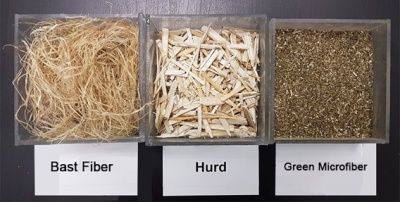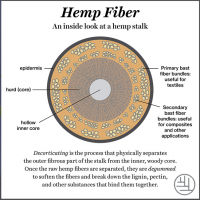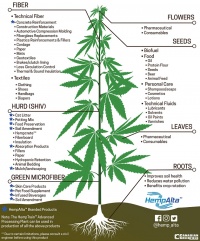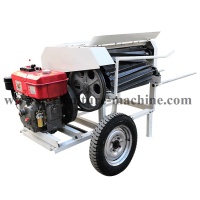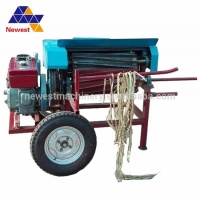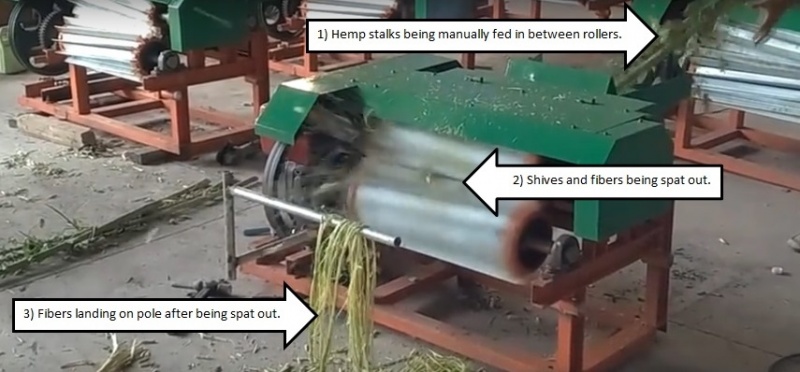Hemp Decorticator: Difference between revisions
No edit summary |
|||
| Line 40: | Line 40: | ||
Several hemp stalks are simultaneously fed into one end of the machine, in between a pair of rollers. | Several hemp stalks are simultaneously fed into one end of the machine, in between a pair of rollers. | ||
(A Feeding hopper can facilitate feeding and create a safe distance between the user and the rollers.) | |||
When crushed in between the rollers, hemp stalks are divided into two materials: | |||
* Shives | |||
* Bast fibers | |||
The soft bast fibers covering the woody interior come loose when the woody interior is crushed into shives. | |||
The | |||
The blades of all rollers are blunt. That way, fibers are not damaged, but stalks are still crushed into hurd and the fiber is separated from the stalk. | The blades of all rollers are blunt. That way, fibers are not damaged, but stalks are still crushed into hurd and the fiber is separated from the stalk. | ||
| Line 61: | Line 63: | ||
The rollers are connected via a gears and driven by a motor. The | The rollers are connected via a gears and driven by a motor. The rollers are supported by bearings positioned at each end of the shafts. | ||
[[File:Hemp decorticator.jpg|800px]] | [[File:Hemp decorticator.jpg|800px]] | ||
Revision as of 16:56, 24 April 2021
Overview
A hemp decorticator is a machine that separates hemp stalks in to different materials that are used for a vast array of products;
· Bast fiber; for plastics including 3D printer filament, composite materials, textile, etc.
· Hurd (also called shives); for paper, hempcrete, insulation, fibre board, etc.
· Green microfiber; beauty products, CBD, nutritional products, etc.
Hemp seeds can also be used and turned in to food products, ink, paint, lubricant, etc.
For more examples of uses for hemp, see Hemp.
| Hemp stalk materials | Stalk cross section | Plant anatomy and uses | Image of a hemp decorticator | Image of a hemp decorticator |
|---|---|---|---|---|
A hemp decorticator can also be used for other plants such as jute or kenaf.
Versions
Replications
No versions of this product have been replicated yet.
The following format can be used to reference a replication:
[Start date YYYY-MM-DD, Location, Product version, Link to a page showing some documentation of the replication process or results]
Details
Working principle:
Several hemp stalks are simultaneously fed into one end of the machine, in between a pair of rollers.
(A Feeding hopper can facilitate feeding and create a safe distance between the user and the rollers.)
When crushed in between the rollers, hemp stalks are divided into two materials:
- Shives
- Bast fibers
The soft bast fibers covering the woody interior come loose when the woody interior is crushed into shives.
The blades of all rollers are blunt. That way, fibers are not damaged, but stalks are still crushed into hurd and the fiber is separated from the stalk.
First pair of rollers roll the stalks into the second pair of rollers.
The second pair of rollers spin at a different rpm than the first pair and further crushes stalk into hurd while separating fiber.
Hurd and fibers are spat out from in between the second pair of rollers.
Fibers are "caught" on a Horizontal pole placed close to the second roller pair.
Hurd can be caught in a Net surrounding the output-end of the machine.
The rollers are connected via a gears and driven by a motor. The rollers are supported by bearings positioned at each end of the shafts.
